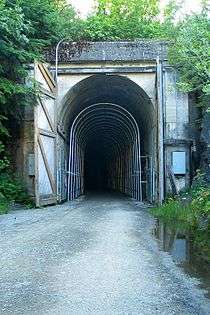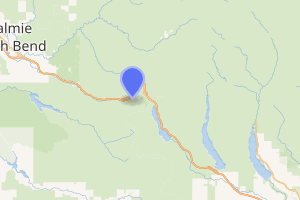Snoqualmie Tunnel
The Snoqualmie Tunnel is a former railroad tunnel near Snoqualmie Pass in the U.S. state of Washington, located east of Seattle. The tunnel crosses the Cascade Range about three miles (5 km) south of the pass, which is used by Interstate 90, on the border between King County and Kittitas County. It is 11,894 feet (2.253 mi; 3.625 km) long and is at an approximate elevation of 2,600 feet (790 m) above sea level, just north of Keechelus Lake.[1] Its east portal is at Hyak.
 East portal at Hyak in 2006 | |
| Overview | |
|---|---|
| Location | Hyak, Washington |
| Coordinates | 47.3947°N 121.3963°W |
| Crosses | Cascade Range, near Snoqualmie Pass |
| Operation | |
| Work begun | 1912 |
| Opened | 1914, 106 years ago |
| Operator | Milwaukee Road |
| Character | Rail until 1980, now non-motorized trail |
| Technical | |
| Length | 2.2526 miles (3.625 km) |
| No. of tracks | Single |
| Track gauge | Standard |
| Electrified | Yes |
| Highest elevation | 2,600 feet (790 m) |
| Route map | |

| |
The tunnel was originally constructed for the Chicago, Milwaukee, St. Paul and Pacific Railroad in the early 1910s and was abandoned in 1980. It now serves as part of a rail trail in Iron Horse State Park, known officially as the Palouse to Cascades State Park Trail. The trail was formerly known as the John Wayne Pioneer Trail and commonly called the Iron Horse Trail.[2][3] A major renovation to the walls, ceiling, and path were completed in July 2011 after a two-year closure.[4][5]
History
The tunnel was constructed from 1912–1914 by the Chicago, Milwaukee, St. Paul and Pacific Railroad ("The Milwaukee Road") as part of its line from Chicago to Seattle, completed in 1909. It replaced a temporary surface line over Snoqualmie Pass at 3,020 feet (920 m); this grade from Hyak to Rockdale later became U.S. Route 10, now the eastbound lanes of I-90. The tunnel is aligned east-west and electrification in 1917 eliminated smoke dissipation issues.
In 1980, the Milwaukee Road received approval from the Interstate Commerce Commission to abandon its lines west of eastern Montana. On March 15, 1980, the final Milwaukee Road train passed through the tunnel. Later, the State of Washington acquired the right-of-way for recreational use.
Today the tunnel is part of the Iron Horse State Park rails-to-trails project. It is usually closed between November 1 through early May due to ice formations inside the tunnel. On July 5, 2011 the tunnel re-opened after 11 months of renovations. The $700,000 renovation added a four-inch (10 cm) layer of concrete to the walls and ceiling, a reinforced structure, and a new and improved walking surface of crushed rock.[5]
Gallery
 About 200 yards from exiting the west side of the Snoqualmie Tunnel
About 200 yards from exiting the west side of the Snoqualmie Tunnel The west entrance to the Snoqualmie Tunnel
The west entrance to the Snoqualmie Tunnel Snoqualmie Tunnel 1912-1914.
Snoqualmie Tunnel 1912-1914. Inside the tunnel 2008.
Inside the tunnel 2008.
See also
- Cascade Tunnel − Great Northern @ Stevens Pass
- Stampede Tunnel − Northern Pacific @ Stampede Pass
- St. Paul Pass Tunnel − (Idaho-Montana)
References
- Washington Geological Survey (1913). Bulletin - Washington Geological Survey, Issues 16-18. The Survey. p. 259. Retrieved 13 April 2017.
- Johnston, Greg (August 27, 2008). "Rolling on the old Milwaukee rail line". Seattle Post-Intelligencer. Retrieved January 9, 2017.
- Paul, Crystal (May 17, 2018). "Former John Wayne Pioneer Trail renamed Palouse to Cascades State Park Trail". The Seattle Times. Retrieved May 17, 2018.
- Dolstad, Mackenzie. "Grand Re-opening of Snoqualmie Pass Tunnel". Mountains to Sound Greenway. Retrieved 8 June 2011.
- Mapes, Lynda V. (July 6, 2011). "Snoqualmie Tunnel gives cyclists, riders cool new link". Seattle Times. Retrieved January 8, 2017.
External links
| Wikimedia Commons has media related to Snoqualmie Tunnel. |
- Washington State Parks - Iron Horse State Park Trail
- Snoqualmie History
- Study of Tunnels on Rail Trails
- Washington Trails Association - Iron Horse tunnel